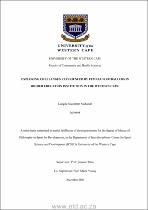| dc.contributor.advisor | Titus, Simone | |
| dc.contributor.author | Nsibande, Lungile Nicollette | |
| dc.date.accessioned | 2022-04-04T10:28:39Z | |
| dc.date.available | 2022-04-04T10:28:39Z | |
| dc.date.issued | 2021 | |
| dc.identifier.uri | http://hdl.handle.net/11394/9029 | |
| dc.description | Magister Philosophiae - MPhil | en_US |
| dc.description.abstract | Sport activities are important and helpful for the general development of its participants without unfairness. Women have the same right as men to take part in the sports activities, but women face challenges of inequality throughout the world. The South African female football team has been competing at a high level and have become inspirational role models for many women and girls. Internationally, football and sport has revealed a positive effect on highlighting issues related to gender in sport. This includes a chance for women to earn self-esteem and confidence, have constructive interactions with men, and challenge unequal gender norms. However, little is known about the experiences of female footballers in institutions of higher learning with regards to some of the challenges. Therefore, this study aims to explore challenges experienced by female footballers at a HEI in the Western Cape. This study will use a qualitative method to explore a case of female footballers at a higher education institution in the Western Cape. Data was collected from 10 female footballers in two focus group discussions, as well as key informant interviews with the sport managers, sport officer and coaches of the football team. Thematic data analysis was used to analyse the data. To ensure confidentiality and anonymity, the respondents were given codes/ pseudonyms instead of using their real names. All data was treated with the strictest confidentiality and all ethics protocols have been observed. The interviews were transcribed by the researcher while raw data was coded and clustered into categories and themes as they emerge from the data. The main finding of this study reveals that there is inadequate funding for women’s football. In addition to receiving less support than that their male counterparts, there appears to be a negative attitude towards female footballers. | en_US |
| dc.language.iso | en | en_US |
| dc.publisher | University of the Western Cape | en_US |
| dc.subject | Football | en_US |
| dc.subject | Women Football | en_US |
| dc.subject | Sport | en_US |
| dc.subject | Women in Sport | en_US |
| dc.subject | Challenges | en_US |
| dc.subject | Football Experience | en_US |
| dc.subject | Higher Education | en_US |
| dc.subject | South Africa | en_US |
| dc.subject | Females & University Sport | en_US |
| dc.title | “Exploring challenges experienced by female footballers’ in a higher education institution in the Western Cape” | en_US |
| dc.rights.holder | University of the Western Cape | en_US |

